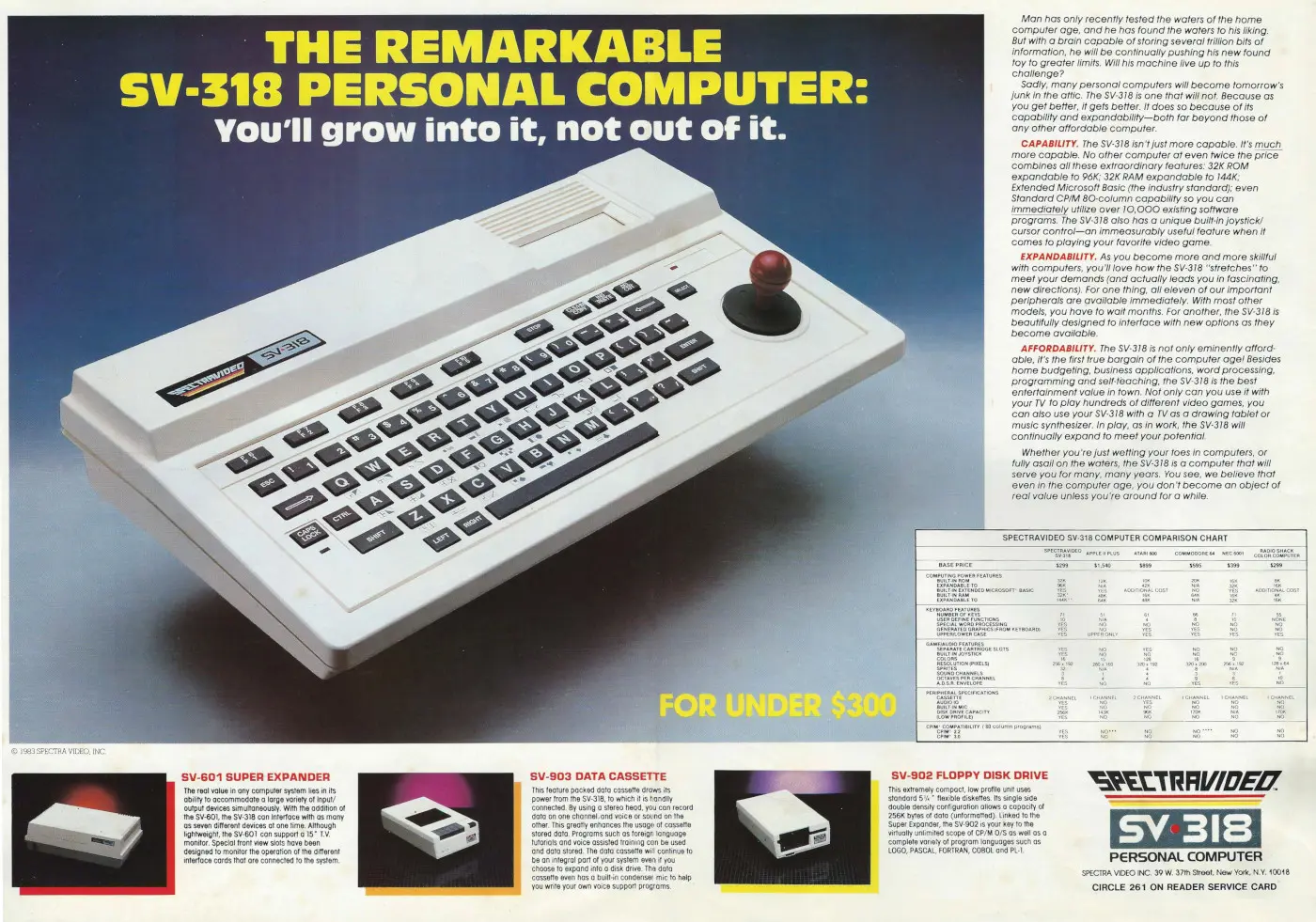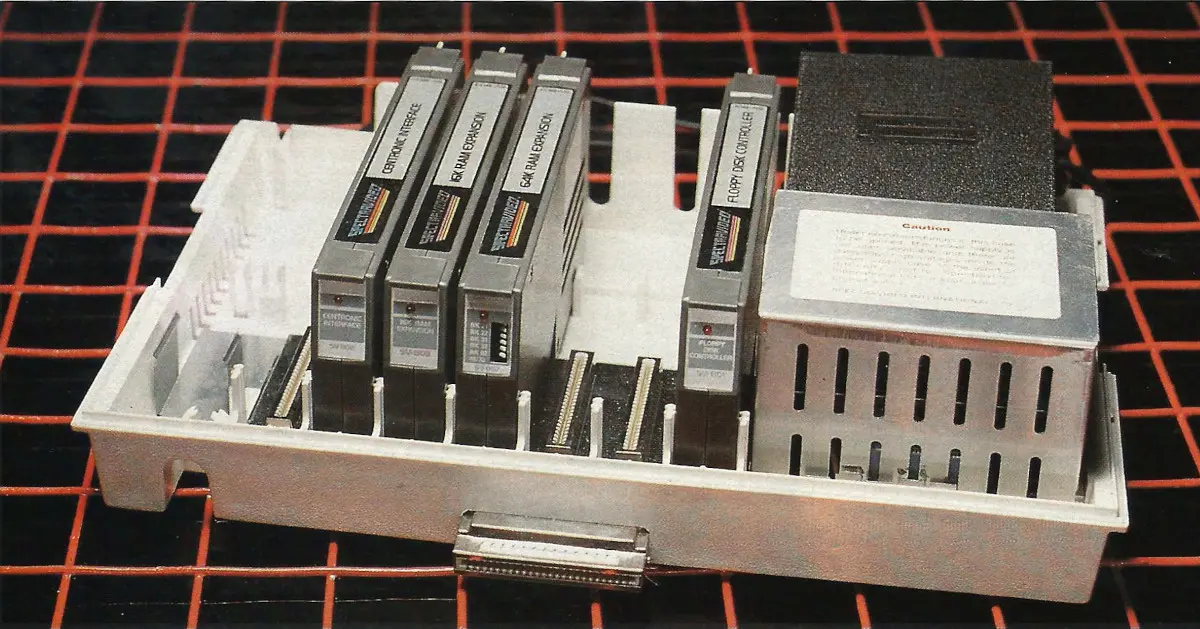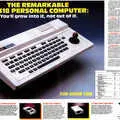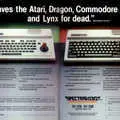Spectravideo Advert - August 1983
From Creative Computing

The Remarkable SV-318 Personal Computer
The Spectravideo SV-318 was a Zilog Z80A-based computer with 32K RAM and Microsoft BASIC, which had been the de-facto standard on pretty much every computer since the MITS Altair of 1975.
When launched in the US it retailed for $299, or about £910 in 2026 terms, and had a chiclet keyboard with an unusual built-in joystick which could be removed for 4-way cursor use.
It was also "almost, but not quite, an MSX machine[1]". MSX was a new standard, launched in June 1983, and put forward by Microsoft in Japan. It mandated the same common processor, graphics and sound chips, as well as Microsoft Extended BASIC, so that all machines were compatible, benefitting add-on manufacturers and software houses[2].
Judging by the presence of magazines like "Woman's Own" and "Options" at the UK launch of MSX in September 1984, MSX appeared to be aimed at a similar market to that which many MSX participants were used to - hi-fi, washing machines and video recorders - as Personal Computer News noted drily in its September 29th issue.
Many "full" MSX machines didn't make it to the UK until November of 1984 - seven or eight months after MSX was originally meant to have landed - and some manufacturers were even holding out until spring of 1985, apparently in order to ensure supplies were available to satisfy "the expected demand".
The main reason for trailblazer Spectravideo's "not quite MSX-ness" was that although the company claimed that the SV-318 was the UK's first MSX-software-compatible computer, it had a different cartridge slot which was incompatible with the MSX standard[3].
This wasn't entirely Spectravideo's fault, however, as the MSX specification was changed after the 318 had been designed[4].
The SV-318, and its sibling the SV-328, had been moderately successful in the US - from where this advert originates - but when they were launched into the UK during the week of 3rd November 1983, they didn't generate much interest or attention.
The timing was somewhat unfortunate as it meant that Spectravideo missed the bulk-buying season for the Christmas period, when all the High Street chains sorted out what they were selling, and the machine's peripherals were said to be expensive.
Like Commodore's VIC-20 and C64, it required a dedicated cassette player at a similarly expensive £44.90[5]. This was down to £39 (£170 in 2026) by the following March, with the impressive-but-also-exepnsive £99 (£430) "Super Expander" - a box even larger than the SV-318, but with its own power supply which could host up to six additional plug-in units.

Spectravideo's "Super Expander" for both the SV-318 and 328. From Personal Computer World, March 1984
Both the SV-318 and SV-328 - the first MSX machines to reach the UK - were reviewed in March 1984's Personal Computer World, with Tony Hetherington writing that:
"The Spectravideo is priced to be in direct competition with the Commodore 64 and BBC Micro. It costs too much to be a serious threat to the cheaper Spectrum and Oric end of the market. For the money, it offers good value - bearing in mind its advanced sound and graphic capabilities. As an advert for MSX the Spectravideo is ideal".
However, there were reservations about the "scope and future development" if MSX became a standard, in particular how a future improvement to the standard might render all the existing MSX machines obsolete, thus defeating the whole point.
There was also the issue at the time that there was only one non-Japanese company involved - Spectravideo - with the rest reading like a list of the entire Japanese electronics industry: Canon, Fujitsu, Hitachi, JVC, Kyocera, Matshushita (Panasonic), Mitsubishi, NEC, Sony, Pioneer, Sanyo, Toshiba and Yamaha[6].
Manufacturer diversity did improve slightly at the end of 1984 when the Korean company GoldStar launched its own MSX micro.
Hetherington continued in his conclusion that:
"To become accepted as the standard throughout the world, MSX will have to extend beyond the one non-Japanese company and include such companies as Sinclair, Acorn and, of course, IBM. This is highly unlikely since each of these companies is trying to make its own dialect of BASIC the industry standard. It is even less likely that Acorn will join MSX since the BBC Micro and Electron use the 6502 processor as opposed to the MSX standard of Z80. Clearly, MSX will not become the only system for home computers and I envisage a situation similar to the video record market where not one but three different systems (VHS, Betamax and LaserDisc) compete for supremacy[7]".
Ultimately, neither the Spectravideo - a machine described as "ill-fated" - nor the MSX standard fared particularly well, which was a relief to incumbent manufacturers as many of them had been terrified of a Japanese invasion since almost the start of the home computer revolution in the late 1970s.
MSX's eventual launch at the end of 1984 was rather unfortunately timed as it was a period described by Tony Smith of The Register as a "sales wasteland"[8].
There was a reason for that: it was the beginning of the end of the home computer boom in the UK.
Date created: 01 July 2012
Last updated: 12 January 2026
Hint: use left and right cursor keys to navigate between adverts.
Sources
Text and otherwise-uncredited photos © nosher.net 2026. Dollar/GBP conversions, where used, assume $1.50 to £1. "Now" prices are calculated dynamically using average RPI per year.

